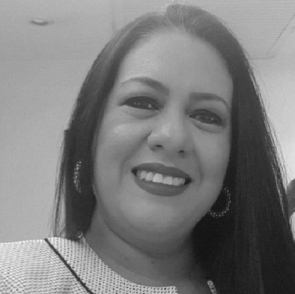Smear campaigns and threats against journalists and women human rights defenders
Smear campaigns, threats and online harassment against several journalists and women human rights defenders, including Mariana Belloso, Bessy Ríos, and Karen Fernandez, have intensified in the last month since the new government took office in the beginning of June 2019. All of these journalists had previously expressed concerns about possible adverse human rights impacts of the new “plan de control territorial”.
 Bessy Ríos is a jurist and human rights defender who is known in El Salvador for her use of social media to promote women’s rights, sexual diversity, freedom of expression, as well as the strengthening of democracy in the country. She is an expert on feminism and gives lectures about the topic.
Bessy Ríos is a jurist and human rights defender who is known in El Salvador for her use of social media to promote women’s rights, sexual diversity, freedom of expression, as well as the strengthening of democracy in the country. She is an expert on feminism and gives lectures about the topic.
Smear campaigns, threats and online harassment against several journalists and women human rights defenders, including Mariana Belloso, Bessy Ríos, and Karen Fernandez, have intensified in the last month since the new government took office in the beginning of June 2019. All of these journalists had previously expressed concerns about possible adverse human rights impacts of the new “plan de control territorial”.
Mariana Belloso is a journalist who works for the newspaper La Prensa Gráfica. She received an award for journalistic excellence in 2017 and writes opinion columns about political and economic issues in El Salvador.
Bessy Ríos is a jurist and human rights defender who is known in El Salvador for her use of social media to promote women’s rights, sexual diversity, freedom of expression, as well as the strengthening of democracy in the country. She is an expert on feminism and gives lectures about the topic.
Karen Fernandez is a journalist for the program FOCOS, which focuses on national political issues and denounces human rights violations in El Salvador.
On 1 July 2019, the new President of El Salvador, Nayib Bukele, publicly criticised the work of several journalists who are denouncing the new security policy of the government, the “plan de control territorial”, which seeks to increase police and military presence in the streets in some regions of the country.
On 30 June 2019, Maria Belloso wrote an opinion column called “o conmigo o contra mi” (either with me or against me) in which she criticised how freedom of expression is being hampered in El Salvador by continuous online attacks and harassment. After the column was published, public figures that are close to the president referred to her as “trash of journalism”. This was followed by a wave of cyber harassment against her from anonymous accounts. On 11 July 2019, her Twitter account was deactivated for three days after a tweet regarding gangs in EL Salvador.
On 28 June 2019, during an interview for the program “Republica SV”, the journalist Karen Fernandez shared her opinion about the “plan de control territorial”: the journalist pointed out similarities between the discourse justifying the repressive measures that the new government is implementing and the discourse used by previous governments. In addition, she expressed concern about the conditions that people deprived of liberty will experience in the framework of the plan. After the interview, President Nayib Bukele retweeted some parts of the interview, taking them out of context, which started a wave of insults and sexual threats by fake and anonymous Twitter accounts.
This is not the first time that Karen Fernandez faces online harassment; in August 2018 she received insults and misogynistic comments after an interview with the vice-president. The lawyer and woman human rights defender Claudia Ortiz was also attacked on social networks for expressing the same concern about possible human rights violations in the framework of the “plan de control territorial”.
On 25 June 2019, journalist Bessy Ríos addressed Guillermo Gallegos from the GANA party on national television after he referred to human rights defenders as defenders of gang members. She demanded an end to this narrative criminalising human rights defenders. That same day, a number of anonymous twitter accounts attacked the defender associating her with illegal groups, blaming her for criminal acts, and threatened to kill her.
Front Line Defenders remains concerned that instead of condemning these attacks against journalists, government officials encourage them through tweets and offensive remarks. We remain extremely worried that in the case of women journalists, these threats are often accompanied by misogynistic, sexist and degrading remarks. It is particularly worrying when heads of states and public officials make use of their visibility and authority to publicly discredit journalists and human rights defenders and their work, as this generates an adverse and possibly more dangerous climate for those who practice these professions. Public officials are subject to a greater public scrutiny and have a greater responsibility over their discourse and its impact.
